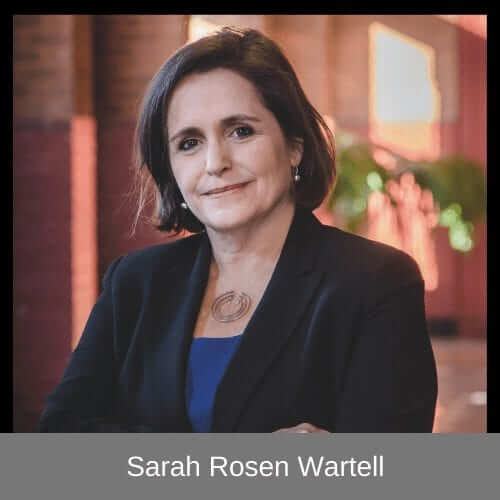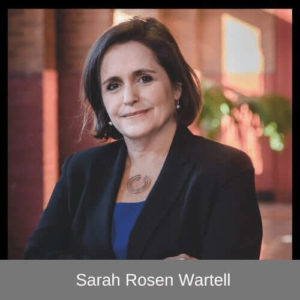
Sarah Rosen Wartell Ep. 60 - Sarah Rosen Wartell has articulated a strategy for Urban: elevate the debate. She discusses how data availablility through Urban can assist decisionmmaking in addressing racial disparities in housing. She is the public policy executive and housing markets expert who serves as president of the Urban Institute, a nonpartisan social and economic policy research institute in Washington D.C. In 2012, Sarah Rosen Wartell became the third president of the Urban Institute since it was founded in 1968. Urban is an economic and social science research and policy organization whose more than 550 researchers, experts, and other staff believe in the power of evidence to improve lives and strengthen communities. She feels Urban can elevate the debate by:
-
- Bringing more of its insights from research to federal, state, and local government and practice
- Becoming a leader in research communications and data visualization
- Undertaking an ambitious program of business systems and technology modernization.
Top Takeaways:
-
- The importance of understanding how racial disparities in housing in the past shaped today to work towards making things better in the future
- How housing impacts the opportunities people have and how that has led to people geographically sorting themselves
- The importance of lived experiences expertise when approaching research in communities
- Using new methods to test whether imputation to a data set of patterns from other data sets can be valid to make decisions on what is likely happening to people on the ground
- Creating a political environment where everyone feels they belong and is treated fairly
Learn about the importance of creating an equal political environment where everyone is treated fairly regardless of their race.
"Individuals can have an impact on society in communities." -Sarah Rosen Wartell
The Urban Institute was born at a time of severe polarization, as Americans clashed about whether and how to grapple with the country's deep legacy of racism and segregation. Early attempts to lift families out of poverty and narrow inequities were often stabs in the dark without a clear understanding of whether new policies were working-or for whom.
Today, the Urban Institute or "Urban" as it is referred to, is an economic and social science research and policy organization whose more than 450 researchers, experts, and other staff believe in the power of evidence to improve lives and strengthen communities. In 2012, Sarah Rosen Wartell became the third president of the Urban Institute since it was founded in 1968.
Previously, Sarah was deputy assistant to the president for economic policy and deputy director of the National Economic Council. At the US Department of Housing and Urban Development from 1993 to 1998, she advised the federal housing commissioner on housing finance, mortgage markets, and consumer protection. Later, she was a consultant to the bipartisan Millennial Housing Commission.
After government service, Wartell was the founding chief operating officer and then executive vice president of the Center for American Progress. Her work focused on the economy and housing markets. She had previously practiced law with the Washington, DC, firm of Arnold & Porter.
Wartell serves on the board of Enterprise Community Partners and on Bank of America's National Community Advisory Council. Her areas of expertise include community development, consumer finance, asset building, and housing finance.
Learn how a large agency can be modernized.
Key Moments:
Sarah explains how Urban Institute works with decision-makers and changemakers to try to answer questions that they're making [3:31]
How she has worked towards bringing modernization, relevance, and impact to Urban Institute which has almost doubled it in size over the last 8 years [5:09]
Sarah admits that as an institution, they didn't do enough to describe racial disparities and unpack their origin [7:08]
Why the existing programs need a better design to eliminate poverty, plus the importance of equity in housing [9:30]
The worry of digital inequities particularly in schools and what Urban is doing to create digital inclusion [12:33]
The importance of understanding what decisionmakers will be asking to have influence and safe change [15:53]
How Urban Institute advises and helps prison administrators build information systems that can be used in real-time in prisons to bring system change and progress [20:55]
Understanding the importance of lived experience expertise when approaching research in the communities [24:08]
Sarah explains the impact of tax cuts or hikes in the wake of a fragile economy caused by COVID-19 [28:03]
How Urban is working to build a connection between research and action and getting close to the people trying to take action on the ground [31:51]
The housing gap due to lack of production and an increase in the population [36:01]
The challenges of the historical political inequality and the growing economic inequality due to the ongoing job loss menace [39:10]
Sarah explains the qualities she believes are needed to succeed as a leader in today's world [42:13]
She advises young people to have an impact in society and communities of their choice by finding allies and organizing for change [44:04]
Resources:
Podcasts Like This:
